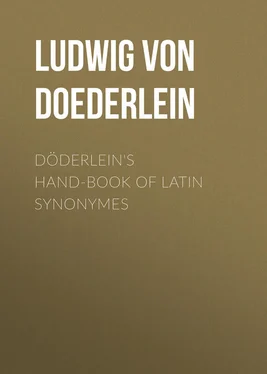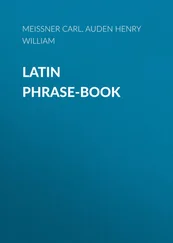Ludwig Doederlein - Döderlein's Hand-book of Latin Synonymes
Здесь есть возможность читать онлайн «Ludwig Doederlein - Döderlein's Hand-book of Latin Synonymes» — ознакомительный отрывок электронной книги совершенно бесплатно, а после прочтения отрывка купить полную версию. В некоторых случаях можно слушать аудио, скачать через торрент в формате fb2 и присутствует краткое содержание. Издательство: Иностранный паблик, Жанр: Языкознание, foreign_antique, foreign_prose, на английском языке. Описание произведения, (предисловие) а так же отзывы посетителей доступны на портале библиотеки ЛибКат.
- Название:Döderlein's Hand-book of Latin Synonymes
- Автор:
- Издательство:Иностранный паблик
- Жанр:
- Год:неизвестен
- ISBN:нет данных
- Рейтинг книги:3 / 5. Голосов: 1
-
Избранное:Добавить в избранное
- Отзывы:
-
Ваша оценка:
- 60
- 1
- 2
- 3
- 4
- 5
Döderlein's Hand-book of Latin Synonymes: краткое содержание, описание и аннотация
Предлагаем к чтению аннотацию, описание, краткое содержание или предисловие (зависит от того, что написал сам автор книги «Döderlein's Hand-book of Latin Synonymes»). Если вы не нашли необходимую информацию о книге — напишите в комментариях, мы постараемся отыскать её.
Döderlein's Hand-book of Latin Synonymes — читать онлайн ознакомительный отрывок
Ниже представлен текст книги, разбитый по страницам. Система сохранения места последней прочитанной страницы, позволяет с удобством читать онлайн бесплатно книгу «Döderlein's Hand-book of Latin Synonymes», без необходимости каждый раз заново искать на чём Вы остановились. Поставьте закладку, и сможете в любой момент перейти на страницу, на которой закончили чтение.
Интервал:
Закладка:
Caritas, see Diligere .
Carmen, see Canere .
Caro; Pulpa; Viscera; Exta; Intestina; Ilia. 1. Caro means flesh in its general sense, as a material substance, in opp. to fat, nerves, muscles, and so forth; pulpa, especially, eatable and savory flesh, in opp. to bones; viscera, all flesh, and every fleshy substance between the skin and the bones. 2. Viscera, in a narrower sense, means generally, the inner parts of the body; whereas exta means the inner parts of the upper part of the body, as the heart, lungs, and so forth; intestina, interanea, and ilia, the inner parts of the lower part of the body, namely, the entrails; and indeed intestina, and, in the age after Augustus, interanea, meant the guts as digestive organs; ilia, all that is contained in the lower part of the body, and particularly those parts that are serviceable. (v. 145.)
Cassis; Galea; Cudo. Cassis, cassida (from κόττα), is a helmet of metal; galea (γαλέη), a helmet of skin, and properly of the skin of a weasel; cudo (κεύθων), a helmet of an indefinite shape. Tac. G. 6. Paucis loricæ; vix uni alterive cassis aut galea .
Cassis, see Rete .
Castigatio, see Vindicta .
Castus; Pudicus; Pudens; Pudibundus. 1. Castus (from καθαρός) denotes chastity as a natural quality of the soul, as pure and innocent; whereas pudicus, as a moral sentiment, as bashful and modest. 2. Pudicus, pudicitia, denote natural shame, aversion to be exposed to the gaze of others, and its fruit, chaste sentiment, merely in its sexual relation, like bashfulness; whereas pudens, pudor, denote shame in a general sense, or an aversion to be exposed to the observation of others, and to their contempt, as a sense of honor. Cic. Catil. ii. 11, 25. Ex hac parte pudor pugnat, illinc petulantia; hinc pudicitia , illinc stuprum. 3. Pudicus and pudens denote shame as an habitual feeling; pudibundus as a temporary state of the sense of shame, when excited. (iii. 199.)
Casu; Forte; Fortuito; Fortasse; Forsitan; Haud scio an. Casu, forte, and fortuito, denote a casualty, and indeed, casu, in opp. to consulto , συμβεβηκότως; forte, without particular stress on the casualty, τυχόν; fortuito, fortuitu, emphatically, by mere chance, in opp. to causa , ἀπὸ τύχης; whereas fortasse, forsitan, and haud scio an, denote possibility, and indeed fortasse, fortassis, with an emphatic perception and affirmation of the possibility, as approaching to probability, and are in construction with the indicative, ἴσως; forsitan, forsan, with merely an occasional perception of the possibility, and are in construction with a conjunctive, τάχ’ ἄν; haud scio an, with a modest denial of one’s own certainty; consequently, haud scio an is an euphemistic limitation of the assertion. Fortasse verum est, and forsitan verum sit, mean, perhaps it is true, perhaps not; but haud scio an verum sit means, I think it true, but I will not affirm it as certain. (v. 294.)
Casus; Fors; Fortuna; Fors Fortuna; Fatum. 1. Casus denotes chance as an inanimate natural agent, which is not the consequence of human calculation, or of known causes, like συμφορά; whereas fors denotes the same chance as a sort of mythological being, which, without aim or butt, to sport as it were with mortals, and baffle their calculations, influences human affairs, like τύχη. 2. Fors, as a mythological being, is this chance considered as blind fortune; whereas Fortuna is fortune, not considered as blind, and without aim, but as taking a part in the course of human affairs from personal favor or disaffection; lastly, fors fortuna means a lucky chance, ἀγαθὴ τύχη. 3. All these beings form an opposition against the Dii and Fatum, which do not bring about or prevent events from caprice or arbitrary will, but according to higher laws; and the gods, indeed, according to the intelligible laws of morality, according to merit and worth, right and equity; fatum, according to the mysterious laws by which the universe is eternally governed, like εἱμαρμένη, μοῖρα. Tac. Hist. iv. 26. Quod in pace fors seu natura, tunc fatum et ira deorum vocabatur. (295.)
Catenæ, see Vincula .
Caterva; Cohors; Agmen; Grex; Globus; Turba. Caterva, cohors, and agmen, denote an assembled multitude in regular order, and caterva, as a limited whole, according to a sort of military arrangement; cohors, as respecting and observing the leadership of a commanding officer; agmen, as a solemn procession; whereas turba, grex, and globus, denote a multitude assembled in no regular order, grex, without form or order; turba, with positive disorder and confusion; globus, a thronging mass of people, which, from each person pressing towards the centre, assumes a circular form. (v. 361.)
Catus, see Sapiens .
Caupona, see Deversorium .
Causidicus, see Advocatus .
Cautes, see Saxum .
Caverna, see Specus .
Cavillator, see Lepidus .
Celare; Occulere; Occultare; Clam; Abdere; Condere; Abscondere; Recondere. 1. Celare has an abstract or intellectual reference to its object, like κεύθειν, in opp. to fateri , and so forth; synonymously with reticere, Liv. xxiv. 5. Curt. vi. 9; whereas occulere, occultare, have a concrete and material reference to their object, like κρύπτειν, in opp. to aperire , synonymously with obtegere; Cic. Acad. iv. 19. N. D. ii. 20. Fin. i. 9, 30. Att. v. 15: the celanda remain secret, unless they happen to be discovered; but the occultanda would be exposed to sight, unless particular circumspection and precaution were used. 2. In the same manner clam and clanculum denote secretly, in opp. to palam , Cic. Rosc. Am. 8; whereas occulte, in opp. to aperte , Cic. Rull. i. 1. 3. Occulere denotes any concealment; occultare, a careful or very anxious concealment, and on this account finds no place in negative propositions, or as seldom, for example, as redolere . 4. Occultare means to prevent anything being seen, by keeping it covered; whereas abdere, condere, and abscondere, by removing the thing itself; abdere (ἀποθεῖναι) by laying it aside, and putting it away, like ἀποκρύπτειν; condere (καταθεῖναι), by depositing it in a proper place of safety, like κατακρύπτειν; recondere, by hiding it carefully and thoroughly; abscondere, by putting it away, and preserving it. (iv. 45.)
Celeber; Inclytus; Clarus; Illustris; Nobilis. Celeber (from κλέος) and inclytus (from κλυτός) denote celebrity, as general expressions, chiefly as belonging to things, and seldom as belonging to persons, except in poetry; clarus, illustris, and nobilis, with an especial political reference; clarus (γαληρός) means renowned for eminent services to one’s country; illustris (from ἀναλεύσσω) renowned for rank and virtue; nobilis (from novisse) belonging to a family whose members have already been invested with the honors of the state.
Celebrare, see Sæpe .
Celer, see Citus .
Celer, see Navigium .
Celsus, see Altus .
Censere; Judicare; Arbitrari; Æstimare; Opinari; Putare; Reri; Autumare; Existimare; Credere. 1. Censere, judicare, arbitrari, æstimare, denote passing judgment with competent authority, derived from a call to the office of judge; censere, as possessing the authority of a censor, or of a senator giving his vote; judicare, as possessing that of a judge passing sentence; arbitrari, as possessing that of an arbitrator; æstimare (αἰσθέσθαι), as that of a taxer, making a valuation; whereas, opinari, putare, reri, and autumare, denote passing judgment under the form of a private opinion, with a purely subjective signification; opinari (ὀπίς) as a mere sentiment and conjecture, in opp. to a clear conviction and knowledge. Cic. Orat. i. 23. Mur. 30. Tusc. iv. 7. Rosc. Am. 10; putare, as one who casts up an account; reri as a poetical, and autumare as an antiquated term. 2. Æstimare denotes passing judgment under the form of the political function of an actual taxer, to estimate anything exactly, or according to its real value, or price in money; but existimare, as a moral function, to estimate anything according to its worth or truth; hence Cicero contrasts existimatio , not æstimatio , as a private opinion, with competent judgment, judicio ; Cluent. 29. Verr. v. 68. 3. Censere denotes judgment and belief, as grounded upon one’s own reflection and conviction; credere, as grounded on the credit which is given to the testimony of others. 4. Opinor, parenthetically, implies modesty, like οἶμαι; whereas credo implies irony, like ὡς ἔοικεν, sometimes in propositions that are self-evident, whereby the irony reaches the ears of those to whom the truth could not be plainly spoken or repeated, or who might be inclined to doubt it; sometimes, in absurd propositions which a man thinks fit to put in the mouth of another; sometimes, in propositions so evident as scarcely to admit of controversy. (v. 300.)
Читать дальшеИнтервал:
Закладка:
Похожие книги на «Döderlein's Hand-book of Latin Synonymes»
Представляем Вашему вниманию похожие книги на «Döderlein's Hand-book of Latin Synonymes» списком для выбора. Мы отобрали схожую по названию и смыслу литературу в надежде предоставить читателям больше вариантов отыскать новые, интересные, ещё непрочитанные произведения.
Обсуждение, отзывы о книге «Döderlein's Hand-book of Latin Synonymes» и просто собственные мнения читателей. Оставьте ваши комментарии, напишите, что Вы думаете о произведении, его смысле или главных героях. Укажите что конкретно понравилось, а что нет, и почему Вы так считаете.












